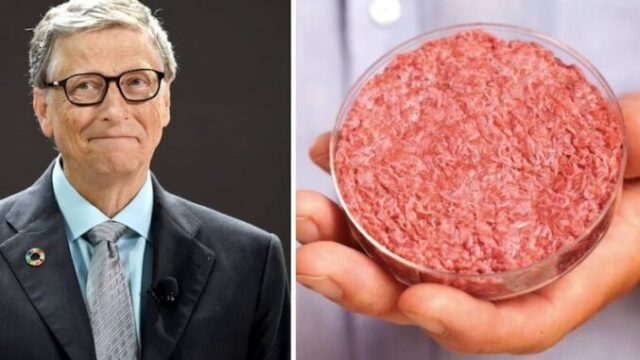Gates’ Fake Meat Company ‘Almost Worthless’ After Stock Price Crash

Bill Gates’ vision to control the global food supply through synthetic “meat” is crumbling before his eyes.
Beyond Meat, once the darling of the plant-based protein industry and valued at nearly $8 billion, is now virtually worthless, writes Frank Bergman .
The fake meat industry has been exposed as a Wall Street bubble with no consumer demand.
On Monday, the company’s shares plummeted 50 percent after it unveiled a desperate plan to roll over debt into new loans and flood the market with hundreds of millions of new shares.
This move gave Beyond Meat more time to pay its bills, but came at the expense of investors, who were left with an ever-decreasing stake.
The crash follows another sharp 35 percent drop on September 28, when the CEO pleaded with investors for more money.
Together, the two sell-offs have completely undermined the company’s value.
Beyond Meat, once a market star, is now worth just $79 million, a pittance compared to its $800 million debt load.
However, analysts say the collapse is not just about Beyond.
The company’s bankruptcy is a reality check for the entire fake meat industry, which has long been supported by celebrities and globalist billionaires like Gates.
“Beyond Meat faces taste and texture issues, high prices, and perhaps an image of being an ‘ultra-processed food,’” said Jerry Thomas, CEO of Decision Analyst.
“The chances of the company surviving are slim.”
The rise and rapid fall of fake meat
Beyond first hit supermarket shelves in 2013, selling packs of 10 meatless burgers featuring a cartoon cow in a cape on the packaging.
By 2019, the company had become the poster child for the globalists’ “meatless future,” touted as a climate-friendly replacement for animal agriculture.
The stock price rose more than 350 percent in the IPO, and fast food giants rushed to test the craze.
McDonald’s added Beyond burgers, Dunkin’ launched a breakfast sandwich, and Burger King promoted the “Impossible Whopper.”
But reality soon hit back.
Consumers rejected the products because of taste, price and distrust due to their highly processed nature.
It also turned out that the products were up to twenty-five times worse for the environment than real meat, which put off the industry’s target audience.
McDonald’s and Dunkin’ quietly scrapped the options after sales collapsed.
Only Burger King still offers its plant-based Whopper.
Neil Saunders, CEO of GlobalData, said in a statement:
“The problem for Beyond Meat is that the company is not living up to its own hype.
“There is a market for fake meat, but consumers are generally skeptical of this category because it is not considered particularly natural and is seen as highly processed.”
The WEF’s “Eat the Bugs” agenda
Beyond Meat’s failure is also a blow to the World Economic Forum’s (WEF) so-called “Great Reset” agenda.
The WEF has openly advocated replacing traditional meat and dairy with synthetic proteins and even insects.
For years, the WEF has urged governments and corporations to steer consumers away from beef and pork and toward lab-grown “meat,” plant-based “substitutes,” and insect-based proteins, touting these so-called “foods” as a “sustainable” solution to “climate change.”
Bill Gates Caught Adding Population Control Agents to Pet Vaccines
WEF white papers declare that by 2030 people will “own nothing and be happy,” a vision that includes global control over diet.
Insects, synthetic proteins, and Gates’ patented fake meat products are supposed to replace animal agriculture and traditional farming, industries labeled “unsustainable” by the elite.
But as with the promotion of electric cars and wind farms, reality has undermined the utopian narrative.
Consumers have rejected insect burgers and cricket flour, just as they’re rejecting Beyond Meat.
Gates’ monopoly on agricultural land
The collapse of fake meat is also linked to Bill Gates’ land grab.
Gates is the largest private owner of farmland in the United States, quietly buying up hundreds of thousands of acres.
Critics argue he is positioning himself to dictate food supplies, shifting farmers away from beef and crops and switching them to his synthetic, globalist-controlled alternatives.
By controlling agricultural land while simultaneously investing in fake meat and lab-grown proteins, Gates hoped to manipulate the market.
Instead, the collapse of Beyond demonstrates that people are unwilling to give up real beef, real dairy , and traditional agriculture for elite-designed substitutes.
The demise of Beyond Meat is more than a business story: it’s evidence that the globalist fake food agenda is crumbling.
Despite billions in hype, corporate support, and media promotion, Americans still prefer real food over Gates’ ultra-processed experiments.
The company once touted as the future of food has become a cautionary tale: when elites try to change people’s diets, consumers resist.
https://www.frontnieuws.com/gates-nepvleesbedrijf-bijna-waardeloos-na-koersval
